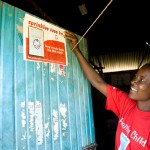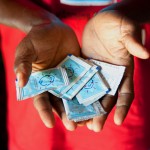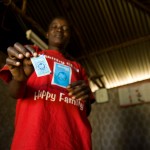You are here
Selling Health: Sprinkles Benefit Women and Children in Rural Kenya
This story was gathered from David Snyder's visit to Kenya. David reports on CDC programs in action for the CDC Foundation.
The Sprinkles product is having a huge impact on villages like Kongele, located in Kenya’s Nyanza Province, where many children suffer micronutrient deficiencies due to limited diets. Introduced by CDC partner agency the Safe Water and AIDS Project – known as SWAP – the Sprinkles vitamin packs are sold at wholesale prices to local vendors like Berlyne Otieno, who then add a small markup and sell the powder packs to local mothers eager to add the powerful vitamin mix to their children’s diets. Thus, the Sprinkles project provides an income to local women’s groups in impoverished rural areas and helps boost the health of local children.



With a quick laugh and an easy smile, Berlyne Otieno is a natural saleswoman. Though she works from the front room of her house, with only a simple sticker on her door to advertise the business within, Otieno is not worried about marketing. Her product, she says, sells itself.
“It has made me known to everyone, everywhere,” Otieno said. “Even when I am going to a wedding or to church, I have to carry Sprinkles.”
The “it” Otieno speaks of is known simply as Sprinkles. Though the name sounds more like a candy than a powdered multivitamin, the Sprinkles product is having a huge impact on villages like Kongele, located in Kenya’s Nyanza Province, where many children suffer micronutrient deficiencies due to limited diets. Introduced by CDC partner agency the Safe Water and AIDS Project – known as SWAP – the Sprinkles vitamin packs are sold at wholesale prices to local vendors like Berlyne Otieno, who then add a small markup and sell the powder packs to local mothers eager to add the powerful vitamin mix to their children’s diets. Thus, the Sprinkles project provides an income to local women’s groups in impoverished rural areas and helps boost the health of local children.
“I tell mothers it contains vitamins and minerals vital for the child from six months to five years,” Otieno said. “They appreciate it very much because it prevents anemia and prevents malnutrition.”
With research support from the CDC and the CDC Foundation, SWAP not only provides the Sprinkles and other health and hygiene products for sale, but also trains the vendors in safe water practices and business skills to strengthen the small community groups through which the vendors typically work. While Otieno jokes that she is known locally as Mama Sprinkles, she also knows first hand what a dramatic impact the vitamin powder can have on developing children.
“I have a child, and since Sprinkles started I have been using it,” Otieno said. “It makes him happy, active, [and] very sharp in class. He’s now going to nursery school and he doesn’t get sick as often.”
Selling an average of 200 Sprinkles packets each week, each for less than three cents, Otieno sees that other mothers in her village also share her enthusiasm for the product. After more than two years of selling Sprinkles, she says it is still one of her most popular items. The results, she says, speak for themselves.
“Sprinkles has improved our community very much,” Otieno said. “Children used to have things like anemia, but now they don’t have that here anymore.”
by David Snyder
PROGRAM SNAPSHOT
Micronutrient Sprinkles Study - Kenya Purpose:
To evaluate the feasibility and effectiveness of distributing micronutrient sprinkles through community vendors, to monitor sprinkles sales and coverage, and to measure the impact of sprinkles use on the incidence of iron deficiency and anemia.
Funding Partner:
Global Alliance for Improved Nutrition (GAIN)
Program Partners:
CDC's National Center Zoonotic, Vector-Borne and Enteric Diseases
CDC's National Center for Chronic Disease Prevention and Health Promotion
Kenya Medical Research Institute
Safe Water and AIDS Project (SWAP)
CDC Principal Investigators:
Parmi S. Suchdev, M.D., M.P.H.
Rob Quick, M.D., M.P.H.
CDC Foundation's Role:
It can be difficult for CDC to contract with and transfer money to partner organizations to do field work in developing countries. The CDC Foundation provided a smooth mechanism for CDC to partner with SWAP and others on the ground in Kenya to put CDC science into action.
